- Home
- Matthew Fitzsimmons
Poisonfeather (The Gibson Vaughn Series Book 2) Page 6
Poisonfeather (The Gibson Vaughn Series Book 2) Read online
Page 6
“Cool, cool. That’s really interesting. Listen, I’m Tommy. People call me Smokestack.” He extended a heavily tattooed hand. “What’s yours?”
So here she was, poised on a familiar precipice. Go on ignoring him and get called a bitch. Tell him she just wanted to be left alone. And get called a bitch. Or be her mother’s version of a good girl, stop what she was doing, and invite the inevitable small talk with some guy who assumed the right to interrupt her because he was a man and she was a woman. And call herself a coward. None appealed.
She shut the magazine again, removed the earbud closest to her unwanted companion, and stared at him. “What?”
“I said, my name’s Tommy—”
“I’m meeting someone,” she said. It was technically true, just not today.
“Cool, so I’ll just keep you company until they get here.”
“Christ, Tommy,” Margo snapped. “Girl couldn’t be saying ‘leave me alone’ any louder if she had a megaphone.”
“I’m just trying to talk to her.”
“She’s reading a magazine.”
“It’s a bar, Margo.”
“What? Everyone comes to bars to talk to you?”
“Yeah, why not? Why else she here?”
“Maybe eat her food and read her magazine like she’s doing?”
“What the hell?” he asked rhetorically.
“Come down the other end of the bar, and I’ll buy you a shot.”
Old Charlie perked up at the prospect of free shots, Tommy less so.
“Why you defending this stuck-up skank? I didn’t do nothing.”
There it was. She’d gone from girl he wanted to meet to skank in less than sixty seconds. All for the sin of reading in a public place. The bar went perversely, expectantly still. Lea could feel her temper wake and uncoil with reptilian malice. There was a good chance she was going to regret this, but she had no more give for the Tommys of the world.
“Hey, Tommy, tell me something,” Lea said.
“Yeah? What?”
“What do guys with big dicks say in the morning?”
“Huh?” The question confused him. “What?”
Lea nodded. “Yeah, I didn’t think you’d know.”
She said it loud so everyone could hear, then swiveled slowly back to the bar and reopened the magazine. For its part, the bar let out a collective “oh” as it registered what she’d said. The ones that missed it asked their friends like they’d missed a line in a movie. There were a couple of ways this could go. Lea didn’t see anyone leaping to her defense. One time in four, a friend would intercede and cool the situation down, but Lea knew better than to count on those odds. She’d been working here for almost two years, but she wasn’t from here; these weren’t her people.
Someone laughed. Could have been laughing about anything, but there was only one way Tommy would interpret it, and that would narrow his options considerably. Lea heard him curse and felt his fist close in her hair, wrenching her head back and up. She let out a yelp and stood up on her tiptoes, following his hand like a marionette. Anything to keep her scalp from coming off. The pain forced tears into her eyes, but it was the yelp that really bothered her. Don’t do that again, she admonished herself.
A baseball bat came down hard on the bar and then pointed at Tommy.
“Don’t make me come out from behind the bar.”
“You hear what she said to me?”
“Do I look like The People’s Court?” Margo asked. “I don’t care what she said, or if it gave you diaper rash. I don’t want to deal with the sheriff today. Do you? How long you been out anyway? Two days? You really miss a cell that much?”
“This is some bullshit,” Tommy said.
Lea felt his fist tighten. She was right; she definitely somewhat regretted it, but this is what came of leaving her gun upstairs.
“Let loose of her,” and when that didn’t work, Margo yelled, “Thomas Edward Hillwicky, let my bartender go, or I will knock your one good memory out of that dumbass head of yours.”
Tough spot, Tommy. Back down from a woman, even one who would crush him like a beer can, and they’d still be joking about it in his eulogy. That was how it went among men.
Tommy did the only thing he could that wouldn’t land him in the ER and would also save face. He pitched Lea forward. Not hard enough to hurt her, but enough to let her know it was only by his good graces that she had all her teeth. For good measure, he picked up her beer and shattered it across the floor, then set to cursing Margo at the top of his lungs. Margo, for her part, just stood with the baseball bat lying across the bar and stared him down. Finally, one of Tommy’s friends stepped up and tried to talk sense to him. Tommy used that as his excuse to be done with the lot of them.
“The hell with this dump,” he said, then told his friend where he could go and told Margo the same for good measure. On his way out, he pointed a predatory finger at Lea. “Bitch, I’ll be seeing you.”
When he was gone, show over, the bar returned quickly to life. Lea pressed her hands to her head and pivoted on her stool so she could see the door in case Tommy got any ideas about round two. His threat left her feeling queasy. He’d said something, she’d said something back, but this would end up her fault. She knew that. She was the outsider. Two years in Niobe didn’t mean you belonged. It was how these things went, and she could feel the heat of angry eyes on her back. Good old Tommy, fresh out of jail and kicked out of his own bar. She could hear the narrative forming even before Margo finished mopping up the spilt beer.
“Do me a favor, hon,” Margo said.
“What’s that?”
“Next time you feel like reading, try a Starbucks.”
As if Niobe had a Starbucks.
“Really? You let people talk to you like that?”
“No,” Margo allowed. “But I’m not built like one of the Gilmore Girls.”
“How about you let me fight my own battles?”
Margo stopped mopping and looked Lea up and down. Lea could feel Margo weighing her up like a butcher weighed ground beef. Margo had fifty or sixty pounds on her. All muscle.
“Well, look at you, the last of the hundred-ten-pound shit kickers,” Margo said with a grudging smile. “Hon, you’re a real pretty girl, but you aren’t gonna be pretty for long fighting your own battles.”
“No one stays pretty forever.”
“Maybe, but there’s no call to go rushing into ugly.”
Lea shrugged.
“Well, you do as you like. I’ll be over there pouring drinks and minding my own business if you decide to raise any more hell.”
“I’ll try not to disturb anyone else with my reading.”
Margo shook her head and left her to her magazine. Down the bar, Old Charlie caught her eye and raised his glass to her.
CHAPTER SEVEN
It felt wrong to abandon Judge Birk. Not that sitting here with him helped anything, but it was a pretty day and he doubted the judge got many social calls. During Gibson’s trial, the judge had kept a stocked minifridge in his chambers and had given him an RC Cola before offering him the Marine Corps option. It had been about the first human thing a stranger had done for him in over a year, and RC Cola would forever remind him of the moment his life stepped back from the brink.
Gibson reached for the grocery bag. It had taken calls to six different stores to find the glass bottles that the judge had favored back then. It seemed like a nice gesture at the time but rang hollow now. Gibson opened a bottle, tossed the cap on the table, tipped his head back, and drank. Warm from the drive, it tasted good all the same. He glanced over at the judge, who was staring intently at the bottle.
“Gibson Vaughn, are you going to offer me one of those, or are you here to torture me like my nephew?”
It startled him, and he jumped a little, then laughed at himself. “Offer you one, sir.”
“Well, all right then. Make it a good one.”
And like that, the Judge Hammond Birk that
Gibson remembered was back in the saddle—tone and body language shifting more than a decade in the blink of an eye. Except that they were both a long way from his old judge’s chambers.
“I remembered how you liked it. Not sure how cold they are. It was a drive.”
“At this point, I’d drink one if it had been boiled on a stove.” The judge studied him. “I take it since you’re here that my nephew made good on his threat to involve you in his cockamamy scheme?”
Gibson held up the blue envelope, and the judge shook his head.
“Now that’s not right. I’d give him a piece of my mind if I had any to spare.” The judge smiled wanly. “Forgive the gallows humor.”
Gibson handed a bottle to the judge, who held it up to the light like a fine wine before putting it to his lips.
“Now that is something else,” the judge said, his eyes shining and happy. “You know, if it weren’t for your father, I wouldn’t be addicted to these things. Did I tell you about the fridge he kept in his dorm room? RC Cola—only thing he allowed in it. Lord, but those were good days.”
“You did, sir.”
“He was quite something, your father. Duke Vaughn.” The judge said his father’s name nostalgically. “Surprised me when he befriended someone like me. I didn’t run with his crowd. Caused a bit of a to-do.”
“I don’t think he ever did it the way he was told.”
“You’re right about that. So, did I do anything embarrassing?”
“No, sir.”
“Bullshit. Probably didn’t have any pants on. Wish someone would explain what the hell it is with getting this way that pants become heretical.”
“My daughter isn’t a big fan of them either.”
“You have a daughter?”
“Yes, sir. Name’s Ellie. Seven years old.”
The judge gave Gibson an appraising look. “And what about you, son? How did you turn out? Did I do the right thing there?”
“You mean saving my life.”
“Well, that’s a mite dramatic.”
“I’d probably just be getting out of prison now if it weren’t for you. I still have every one of your letters.”
“Ah, well, apologies for being long-winded. Runs in the family, as you’ve probably gathered. But that makes me happy to hear. I’m glad things worked out for you,” the judge said. “Married?”
“Ex-wife.”
“I’m sorry to hear that. A good marriage seems like such a wonderful thing.”
“Should’ve been. Were you ever married, sir?”
“Me? No. They didn’t let folks like me marry back then. And now? Well, I’m not exactly a catch these days.”
“I don’t know, sir. You’re still a pretty sharp dresser. Pants or no pants.”
The judge stared at him for a moment and then smiled broadly. “You know, you sound just like him. Duke always did like to take the piss out of people, but always with a twinkle in his eye so they never quite got around to punching him on the nose.”
“That runs in my family, I’m told.”
“I do see him in you. Your mother too. Such a lovely woman. Well, good. Good. You seemed like a fine boy, but you can’t always tell. I’m glad you didn’t turn out to be an asshole.”
“Jury’s out on that.”
“Son.” The judge paused meaningfully. “It always is.”
“Yes, sir.”
“Take my nephew, for example. Now I know what you’re going to say, but he’s a good boy at heart. Family’s hit on some hard times, and he’s not taken it well. Not been at his best. None of us has. But I believe there’s hope for him yet.”
“He’s a little prick.”
The judge didn’t argue. “He does like to kick me a little when I’m not all here.”
“I don’t care for it.”
“Well, I don’t remember it most of the time, and it’s not like he doesn’t have a right. I ruined my family by getting them involved with Charles Merrick.” The judge gestured to his trailer. “As you can plainly see from my accommodations.”
“I’m sorry, sir.”
“Well, I made the money, and I lost it. So there’s nothing to be sorry about. That’s what freedom means in this country. I had the freedom to make something of myself, and I had the freedom to screw it up too. And I’ve done both. But getting the family involved . . . that’s the thing I can’t forgive.” The judge sighed. “Despite the example my nephew might set, my family is good people. But ambition has never been in our DNA. Took everyone a little by surprise when I announced plans for law school, and I guess when they made me a judge it earned me a measure of deference among them. Poor bastards.” The judge ran his hand through his beard and down his neck. “I meant well. I did.”
“Your nephew said everyone invested.”
The judge nodded somberly. “Hand me another.”
Gibson cracked another bottle open for him.
“I have three brothers and a sister. My eldest brother, Christopher’s father, inherited the farm from our parents. He invested heavily with Merrick. Another brother owned a small construction company in Charlottesville. He invested.”
“Owned—past tense?”
“Past tense, I’m afraid. My sister is an accountant for a car dealership. She held out, but I got to her. Cost her the house. My youngest brother enlisted in the Navy, was set to retire when he had his twenty. He looked me in the eye and said, ‘I trust you, Hammond.’ I hear him say that often, like he’s here with me. He almost has his thirty now and still can’t retire,” the judge said. “I was ruthless. Some of the extended family had more sense, but I talked them into it in the end. I was always a persuasive son of a bitch. You should have heard me. All but called them ignorant and small-minded. ‘Think about your grandchildren,’ I said. Christ, I was righteous.”
The pain in the judge’s voice broke Gibson’s heart. This man who had done so much for him had no one to fight for his cause. By the end of the story, Gibson wanted to throttle Charles Merrick with his bare hands. The judge looked away and wiped under his eyes with the heel of his hand.
“I don’t have a lot of time here, Gibson. This thing has a mind of its own . . . so to speak. So you’ll forgive me if I get to it?”
There was no self-pity in him, which Gibson admired.
“Yes, sir.”
“Don’t do it.”
“Sir?”
“Whatever my nephew asked. Just walk away.”
“I don’t know if I can do that.”
“You can, and you will. You have a daughter. Responsibilities. I won’t compound my sins by mixing you up in my family’s troubles. Merrick may be a criminal, but stealing from him is still stealing. Christopher can’t see that, but I didn’t send you to the Marines to turn around now and ask you to break the law on my behalf. Can’t do it. So please, I’m asking you, just walk away, son.”
“Yes, sir. If that’s what you want.”
“I appreciate that you made the drive. I’m grateful for the chance to see you.”
“Me too, sir. Should have come sooner. I guess I didn’t—”
“Hush with all that now,” the judge said.
So he did. The two men sat under the awning outside the trailer and finished the six-pack of RC Cola. Gibson told the judge the story of Suzanne Lombard and Duke Vaughn. The whole story. He told him about Atlanta and the promise that he’d made to Grace Lombard. He’d never shared it with anyone up until now, never felt safe. The telling of it was a relief, and he felt better with each word. Unburdened. Even though the judge wouldn’t remember it. Probably because he wouldn’t. When he finished, the judge sat silently for so long that Gibson feared that he’d gone away again.
“Is that her hat?”
Gibson took the cap off his head and handed it to the judge. The judge handled it delicately, pausing to inspect Suzanne’s faded initials written into the brim.
“That’s a hell of a thing,” the judge said at last and gripped Gibson’s hand. “You did good.”<
br />
It shouldn’t have surprised Gibson how good that felt to hear. Through his letters, the judge had filled the void left by his father. And as if the judge had read his mind, he continued.
“He’d be proud of you.”
“Thank you, sir.”
“Thank you, Gibson. Nice to know I did a few things right in my time. Now I need to ask you a favor.”
“What do you need?”
“For you to go.”
“Did I say something? I didn’t—”
“No. It’s been grand. But I’m on borrowed time here. And I want to say good-bye while I’m all here. Understand me? Like two men.”
They stood and shook hands in the dirt.
“Try and remember me this way.”
“I will.”
“And take this with you.” The judge handed him the magazine. “Throw it away. Burn it. I don’t want to see his face again.”
“Take care of yourself, sir.”
“I’ll do my best. Thanks for the RC.” The judge winked. “And thanks for the company. Hit the spot.”
CHAPTER EIGHT
Room SH-219 in the Hart Office Building was the most secure room in the US Senate. The walls were steel cased and RF shielded to prevent electromagnetic observation, and access to SH-219 was strictly controlled—nothing and no one came in or out that wasn’t rigorously screened, right down to the room’s dedicated HVAC system and electricity, which were double-filtered for electromagnetic radiation that might carry a signal. Despite the room’s bug-proof design, those responsible for its security assumed the worst and swept it for listening devices constantly. It was an object lesson in pragmatic paranoia. It had to be.
Within SH-219’s vaultlike doors, the Senate Select Committee on Intelligence heard closed testimony on America’s intelligence activities. When called, emissaries from the seventeen elements of the intelligence community—a feudal patchwork of acronyms ranging from the CIA and the NSA to the INR and the TFI—briefed the committee and answered the senators’ questions.
CIA deputy director René Ambrose found the entire process farcical. Explaining complex strategic operations to elected officials, most of whom he wasn’t altogether convinced knew the difference between Indonesia and Malaysia, cast democracy in a dubious light. It irritated him, and he woke most mornings irritable to begin with. He didn’t care for politics, and as a rule, he didn’t appreciate being drawn away from Langley for this dog-and-pony show. But he was the deputy director of East Asia and Pacific Analysis, and his testimony on China and North Korea had become staples of the committee’s diet.

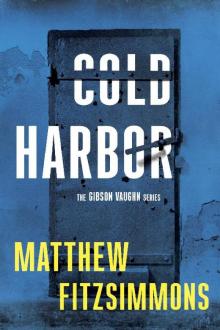 Cold Harbor
Cold Harbor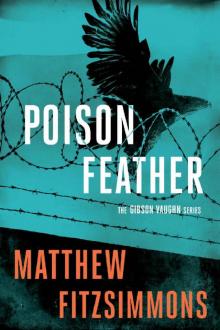 Poisonfeather (The Gibson Vaughn Series Book 2)
Poisonfeather (The Gibson Vaughn Series Book 2)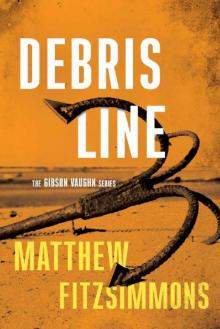 Debris Line (Gibson Vaughn)
Debris Line (Gibson Vaughn)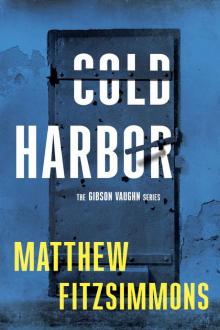 Cold Harbor (The Gibson Vaughn Series Book 3)
Cold Harbor (The Gibson Vaughn Series Book 3)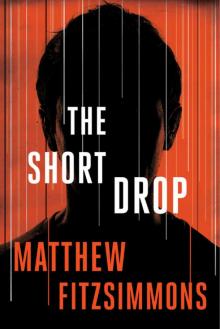 The Short Drop
The Short Drop